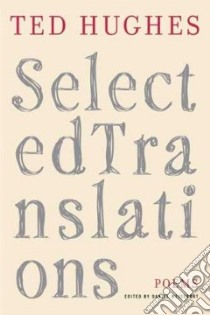Selected Translations - 9780374260682
Un libro in lingua di Ted Hughes Weissbort Daniel (EDT) edito da Farrar Straus & Giroux, 2007
- € 21.00
- Il prezzo è variabile in funzione del cambio della valuta d’origine
The late, great poet's version of poems ancient and modern
Known (with Philip Larkin) as the most distinctly English of the postwar British poets, Ted Hughes was a boundlessly curious reader and translator of poetry from other languages. This generous selection of his translations at once rounds out the publication of his major work and gives us a fresh view of his poetic achievement.In 1965, Hughes, already famous in Britain, founded the journal Modern Poetry in Translation, and a number of the translations here are of poems by his contemporaries: the Israeli Yehuda Amichai, the Hungarian János Pilinszky, and the Serbian Vasko Popa. At the same time, Hughes was forever in search of older precursors, whether Homer, Lorenzo de' Medici, or the authors of Sir Gawain and the Green Knight and The Tibetan Book of the Dead, and his translations of them deepen our sense of his interest in pagan ritual and esoteric religion. These two strains of his work as translator were brought together late in his career, when, with supple and radiant versions of Ovid's Metamorphoses, Aeschylus' Oresteia, and Euripides' Alcestis—all amply represented here—he established himself as one of the foremost interpreters of the classics in English.Selected Translations is a vital addition to the Hughes oeuvre. Ted Hughes (1930–98) produced more than forty books of poetry, prose, drama, translation, and children's literature, including, in his last decade, Shakespeare and the Goddess of Complete Being, Tales from Ovid, and Birthday Letters.
Widely known (with Philip Larkin) as the most distinctly English of the postwar British poets, Ted Hughes was a boundlessly curious reader and translator of poetry from other languages. This generous selection of his translations at once rounds out the publication of his major work and gives us a fresh view of his poetic achievement.
"Hughes, the longtime U.K. poet laureate, and editor Weissbort cofounded the magazine Modern Poetry in Translation, the venue for some of the many impressive short poems here, whose strangeness Hughes's careful versions preserve . . . Strangest of all are brief passages from Orghast, a drama—in a language invented by Hughes—derived loosely from Farsi and classical Greek. Weissbort's long explanatory essay on this play sits well beside his shorter—yet substantial—commentary on each poet and each process of translation, including work from previously unpublished manuscripts."—Publishers Weekly
"Hughes produced more than 40 books during his career, many devoted to poets from diverse cultural sources. Selected Translations amply demonstrates the poet's deep intellectual curiosity, ranging from ancient times (Ovid, Aeschylus, Euripides) through the modern era (Eluard, Lorca, Pilinszky). His were among the first English versions of the great Israeli poet Yehuda Amichai and helped introduce him to the West. Hughes was keenly interested in the ways poetry might function as a cultural bridge, 'a Universal language of understanding, coherent behind the many languages, in which we can all hope to meet.' Along with Daniel Weissbort, he founded the journal Modern Poetry in Translation and worked with international poets and scholars. In introductory passages and extensive appendices, Weissbort carefully conveys the poet's philosophy, methodology and the impact this practice had on his poetry."—The Washington Post
"Hughes (1930-1998), the longtime U.K. poet laureate, and editor Weissbort cofounded the magazine Modern Poetry in Translation, the venue for some of the many impressive short poems here, whose strangeness Hughes's careful versions preserve. There is, for example, the French poet Yves Bonnefoy with his phenomenological investigations ('Profound science where the ancient/ Cerebral bestiary calcines itself'); the wonderfully self-pitying Portuguese modernist Mario de Sa Carniero; and the Hungarian dissident Janos Pilinszky, whose stanzas reflect a veteran's grim experience: prisoners subject to Nazi forced labor 'are carrying the road, they are carrying the land' . . . Strangest of all are brief passages from Orghast, a drama—in a language invented by Hughes—derived loosely from Farsi and classical Greek. Weissbort's long explanatory essay on this play sits well beside his shorter—yet substantial—commentary on each poet and each process of translation, including work from previously unpublished manuscripts."—Publishers Weekly
Informazioni bibliografiche
- Titolo del Libro in lingua: Selected Translations
- Sottotitolo: Poems
- Lingua: English
- Autori : Ted Hughes Weissbort Daniel (EDT)
- Editore: Farrar Straus & Giroux
- Collana: Farrar Straus & Giroux (Hardcover)
- Data di Pubblicazione: 04 Gennaio '07
- Genere: POETRY
- Argomenti : Poetry Translations into English
- Pagine: 256
- Dimensioni mm: 234 x 158 x 25
- ISBN-10: 0374260680
- EAN-13: 9780374260682


